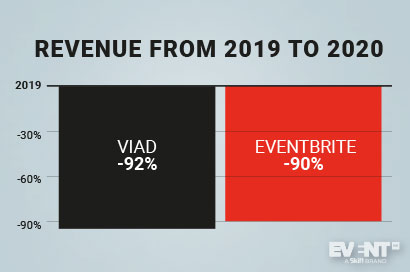Skift Take
Hard-hit event companies are hunkering down, shoring their resources, and looking at new revenue streams to make it through the crisis. While some small, nimble companies are excelling, event giants are in survival mode.
The first quarter saw the event industry reeling from lockdowns, social distancing, and a general atmosphere of coronavirus-related uncertainty that all but shut-down the industry. The entire labor chain from event organizers to suppliers to destinations were counting on the hundreds of millions in revenue from events, and must now learn to cope with the hardship.
Shockingly, the value of the industry to the rest of the world remains underestimated as event professionals and organizations continue to struggle to get the government support they need.
Ironically, those with the most resources are often in the worst position as their sheer size requires a proportionately large revenue stream to sustain. Even tech companies were not spared, and they were arguably in the best position to pivot their value offerings as every student and white collar employee continued life online, hardly skipping a beat. Earlier this year, we reported massive layoffs from staple event tech brands like Cvent and Eventbrite while new players rose to meet the demands of the new market buoyed by a rising tide of investments.
But while the outlook for 2020 remains dreary, the recently released earnings from Eventbrite and Viad showcase how companies are adapting under the pressure and beginning to stabilize.
Steep Losses Were Met With Stark Cuts
Viad is the organization behind experiential event company GES, but has a second branch called Pursuit that focuses on experiential travel within Canada and Iceland. According to their August 6th earnings report, their revenue in 2020 represents a decrease of 92.3 percent from the second quarter of 2019.
Measures taken to mitigate the damage and improve their financial standing to prospective creditors and investors include “[a]ggressive cost reduction actions, including furloughs, layoffs, mandatory unpaid time off, and salary reductions for all employees across the company” in addition to raising a total of $46 million through liquidating assets, included a $17 million GES warehouse.
“At GES, the live event market remains largely closed and our primary focus remains on minimizing the cash burn” as well as pursuing virtual events and preparing to “re-activate areas of GES as it is prudent to do so,” said Viad President and CEO Steve Moster.
The outlook for Pursuit, Viad’s travel experience brand, is decidedly more optimistic than for its events brand, GES:
“We believe the investment from Crestview and the extended waiver period for our financial covenants provide us ample financial flexibility and strength to not only endure what may be a slow recovery within the event industry and a gradual return to normal levels of leisure travel, but also to continue making important investments to fuel the growth of Pursuit.”
– Steve Moster, President and CEO, Viad Corp
Eventbrite reported similar losses in revenue — a 90 percent drop since 2019 according to their August 6th earnings. MarketWatch, a business news and analysis website, broke down the damage as follows:
- Stocks: a $38.6m loss that amounts to 44 cents a share, compared to a loss of $14.8m or 18 cents a share this time last year.
- Revenue: dropped 90 percent to $8.4m
However, they also note that this was better than expected: “Analysts surveyed by FactSet had expected a loss of 50 cents a share on sales of $13.5 million.”
But while Viad is stabilizing by pausing its events business in favor of investing in its travel business (with a focus on local travel), Eventbrite doesn’t have that option.
Instead, Eventbrite cofounder and CEO Julia Hartz acknowledged in mid-June the potential for virtual events to offer that relief. She confirmed that, while only a small proportion of virtual events are paid, they are happening more frequently. High revenue event planners that plan lower-priced events more frequently are doing extremely well.





